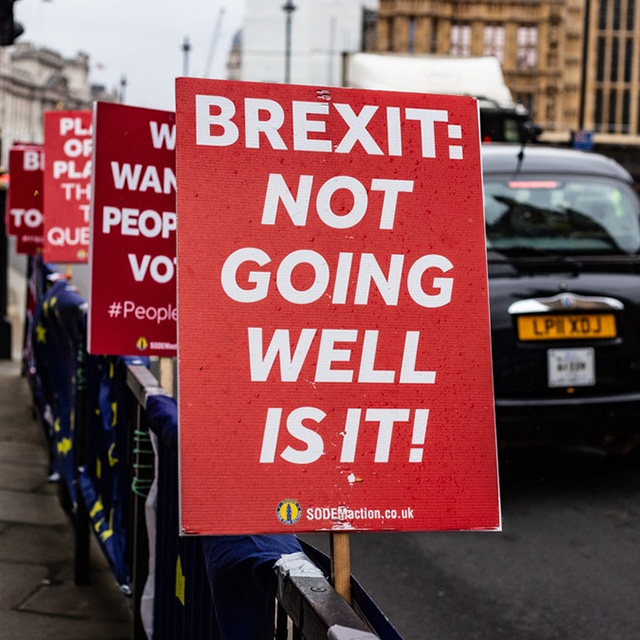
Amidst the very many frustrations I felt listening to Theresa May’s swan song outside Number Ten this morning, it was her expression of “huge regret (that) I’ve not been able to deliver Brexit” that frustrated me the most – and not because the UK still hasn’t left the European Union.
It’s because the word (or should I say, non-word), Brexit, is by now so loaded and tainted by all that has passed since the 2016 referendum that I don’t believe any of the senior, supposedly grown-up leaders who actually have responsibility for delivering this process should be uttering it.
We all know that words are dangerous, particularly for leaders, and so they must choose them very carefully. Theresa May made the decision early in her tenure as Prime Minister to tie herself tightly to the B-word with her now notorious phrase, “Brexit means Brexit.” Before then, yes it was used frequently by the media – it’s brevity was helpful for fitting on front pages – and by UKIP for whipping up a populist storm but it was not, in my view at least, a serious word used by serious people until May took over in Downing Street. Whatever you think of David Cameron (and I know there will be many, many thoughts on that subject), the word Brexit did not appear in his resignation speech when he fell on his sword in the same spot, possibly at the same lectern, almost exactly three years ago.
I could make a light-hearted argument here about why mashed together non-words are always a bad idea. Brangelina were doomed as a couple. Cronuts were a flash-in-the-pan patisserie fad. Sasda was destined never to become the nation’s favourite supermarket etc. However, this is no laughing matter. The process by which we extricate ourselves from the decades-long agreement with the European Union is far too complex to be defined by a single, blunt term and this is where the words used by those tasked with that process are incredibly important. Instead, government needs to be consistently using phrases that accurately describe the reality of the task. There’s a reason someone had the wisdom to call it the ‘Department for Exiting the European Union’. It may be a bit functional but the language used by grown-up people delivering something that is incredibly hard shouldn’t be tabloid and it shouldn’t bow to how other, louder but less involved people, define that project.
Donald Trump ensured the phrase, ‘fake news’, became seared into public consciousness and parlance. It’s interesting to see that Facebook – still right at the centre of the fake news storm – consistently talk about their efforts to “fight false news and the people who traffick misinformation”. Yes, they are going against the tide by doing so but it’s a more accurate and responsible description of the challenge that faces their business and the actions they need to take. Steadfastly refusing to echo Trump’s language also sends a very clear signal of difference between their business and the President’s populist but divisive approach. Facebook, of course, have taken many missteps themselves on the topic but they are right in the way they talk about it.
Those of us in communications know how important language is in these high-stakes and politically charged times. The general public largely think our trade is in glib taglines and irritating buzzwords but that couldn’t be further from the truth. The work I do with business leaders and CEOs every day focuses totally on helping them find the right words to openly and honestly describe the work they do and help them take part in complex debates without resorting to mass generalisations or dangerously simple stereotypes.
Surely that is the least we should expect from those people we entrust to run our institutions, our country and manage this exit process? That is why the new leader of the Conservatives, whomever they may be, would be wise to shun the word Brexit completely and start to reframe the conversation in a way that better befits the challenge and, frankly, the position of Prime Minister.
